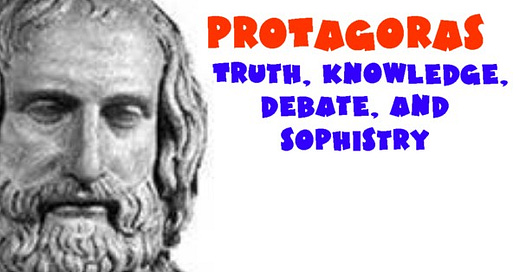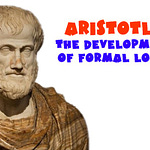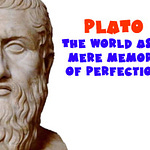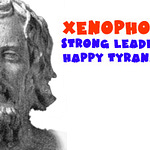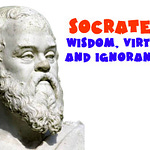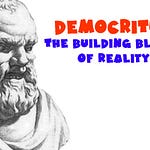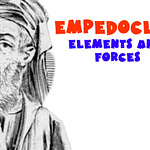Paid subscribers will have access to this and all other videos and bonus content. Please consider upgrading to a paid subscription to enjoy and support this project. If you pay to subscribe I’ll also read your name out at the end of the video.
You can also obtain the benefits of a paid subscription by sharing Three Minute Philosophy with others. For each new friend you bring in, you earn benefits. So spread the word!
For the full archive of videos so far, visit https://www.speterdavis.com/philosophy/
Protagoras of Abdera was a Greek philosopher who lived around 450 BC in northern Greece.
He was a student of Democritus but unlike his teacher he had little interest in any of that stuff about atoms and fire and water and what things are made of. Democritus came up with some relatively satisfying answers and philosophy was otherwise kind of stagnating.
The whole vibe was starting to shift because philosophy was entering what’s known as the Socratic period, named after Socrates, but we’re not quite ready for him yet because we still need to set the stage.
Protagoras was the first philosopher to become famous specifically for thinking that philosophy was pointless nonsense. He was more interested in why people found it interesting and convincing. He was the first major figure to think about the art of the argument itself rather than its content.
I’ve already mentioned how Aesop originated the art of rhetoric but what Protagoras was interested in learning was how to do what he did and do it well. Because for Protagoras arguing itself was really all that philosophy was about. He thought that the truth about the nature of reality was impossible to get to because all you could really ever know was the arguments in favour of one theory or another.
After all, how do you usually decide what you believe if not going with the argument that sounds the most convincing to you?
But Protagoras went a step further because his theories about the relationship between argument and truth raised some interesting ideas about the nature of truth itself. If the definition of truth is just what we think is convincing then does truth really exist outside of our minds?
What Protagoras has stumbled upon here is called Epistemology and it’s one of the three core branches of all of philosophy.
Unlike metaphysics, which investigates questions about reality, epistemology investigates questions about knowledge. What is knowledge, how do we know things, and how do we know that we know things? For Protagoras, if there is an objective reality it’s not something that can ever be truly known because everything depends on somebody’s perspective.
His most famous saying was “Man is the measure of all things.”
Imagine an Olympic javelin competition where one competitor is struck and killed by accident. This seems like an event that can be described pretty easily, but Protagoras thought that it actually depended on the point of view of who you were asking.
A doctor might say that the man was killed by a javelin, but a police officer might say the man was killed by the guy who threw the javelin. A referee might say that the man shouldn’t have walked onto the field so he killed himself. An activist might say that the man was killed by the sport of javelin throwing.
It doesn’t feel like any answer is wrong exactly, but can they all be right? Are any of them more right than the others?
Protagoras thought that the truth was kind of just whatever people decide to accept so questions about the nature of reality could be solved through debate.
That’s right, Protagoras was the first “Debate Me Bro!” He thought the most important skill that you could have was to be an effective debater, which required in depth knowledge of how language and rhetoric work to convince people. He was probably the first major figure to study the philosophy of language, but unfortunately all of his thoughts on this subject are lost.
Nobody preserved his teachings at the time because other serious philosophers didn’t like Protagoras, to say the least. But he was so good at debating that he made a living teaching it, and students of his debate techniques became known collectively as Sophists.
This was an important turning point in the history of philosophy because up until now philosophy was kind of a niche thing practiced by elites, but suddenly Athens was full of Sophists practicing their debate techniques like a bunch of smartass influencers. It was time to shake things up as a shadowy figure was about to emerge from the—
Okay I’ll stop teasing, the next one’s Socrates.
Sources:
Adamson, Peter., Classical Philosophy: A history of philosophy without any gaps. Oxford University Press, 2014
Bonazzi, Mauro., Protagoras. Stanford Encyclopedia of Philosophy, 2024.
Poster, Carol., Protagoras (fl. 5th c. B.C.E.). Internet Encyclopedia of Philosophy, accessed 2024.
What you get for subscribing:
Three Minute Philosophy is a fun and educational series of videos and essays about the history of philosophy.
Essays are free. Paid subscribers will gain access to full videos, printable PDFs, and possibly more in time.
Listen to this episode with a 7-day free trial
Subscribe to Three Minute Philosophy to listen to this post and get 7 days of free access to the full post archives.


